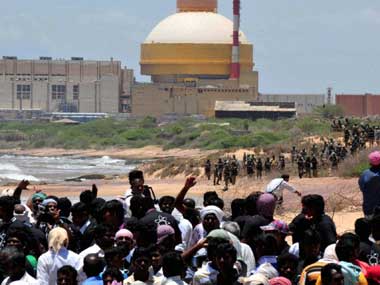India has a robust civilian nuclear program in addition to its nuclear arsenal. India has not signed the international nuclear non-proliferation treaty. This raises concerns when India wants to purchase nuclear technology from other countries. There is a fear that India will convert peaceful nuclear technology to military uses in their nuclear weapons program.
India has recently announced that it will sign an agreement with the International Atomic Energy Agency (IAEA) which will allow the agency to inspect civilian nuclear installations. India wants access to foreign nuclear technology and is signing the agreement as "a signal of our commitment to abide by our international obligations." India had signed a previous agreement with the IAEA in 2008 which opened up nuclear commerce with other countries but critics attacked this earlier agreement as not providing sufficient safeguards against conversion of civilian technology to military uses.
Analysts of the new agreement say that it is an indication that the new government in India is interested in expanding imports of civilian nuclear technology from the United States and Japan. India has massive energy shortages that desperately need to be addressed. In his first speech after his election, Prime Minister Modi has promised to make nuclear power a priority for India. India is seeking billions of dollars for investment in new nuclear power plants. Modi will travel to Japan and the US this summer. Both of these countries have expressed interest in increasing nuclear technology cooperation with India.
Investment in Indian nuclear power plants has been low in recent years. Part of the reason is that there is a strong nuclear liability law that scared off some foreign investors. India already has deals with France and Russia for nuclear technology but just signed a new deal with a US company this year. India is planning to bring several new nuclear power plants online in the coming decade. Greater nuclear cooperation with the US is part of this plan. India intends to get twenty five percent of its electricity from nuclear power by 2050.
India is investing heavily in nuclear power and intends to become a leader in the global nuclear industry. They have worked on fast breeder reactors for years. In addition, they are working on the development of thorium reactors for power generation. India has a great deal of thorium that will be easy to access. There are still many technical problems that must be solved in order for thorium reactors to be put into commercial use.
Critics of Modi's focus on nuclear power are afraid that the Modi government has less concern for environmental dangers than the previous Indian government. There have been indications that the Modi government may use its power to marginalize environment groups and groups pushing alternative energy sources. If India forges ahead with a vigorous nuclear program while turning its back on environmental concerns and alternative energy, I am afraid that there will be major nuclear accidents and a severe public backlash against nuclear power in India.
Protest outside the Indian Kudankulam reactor:
